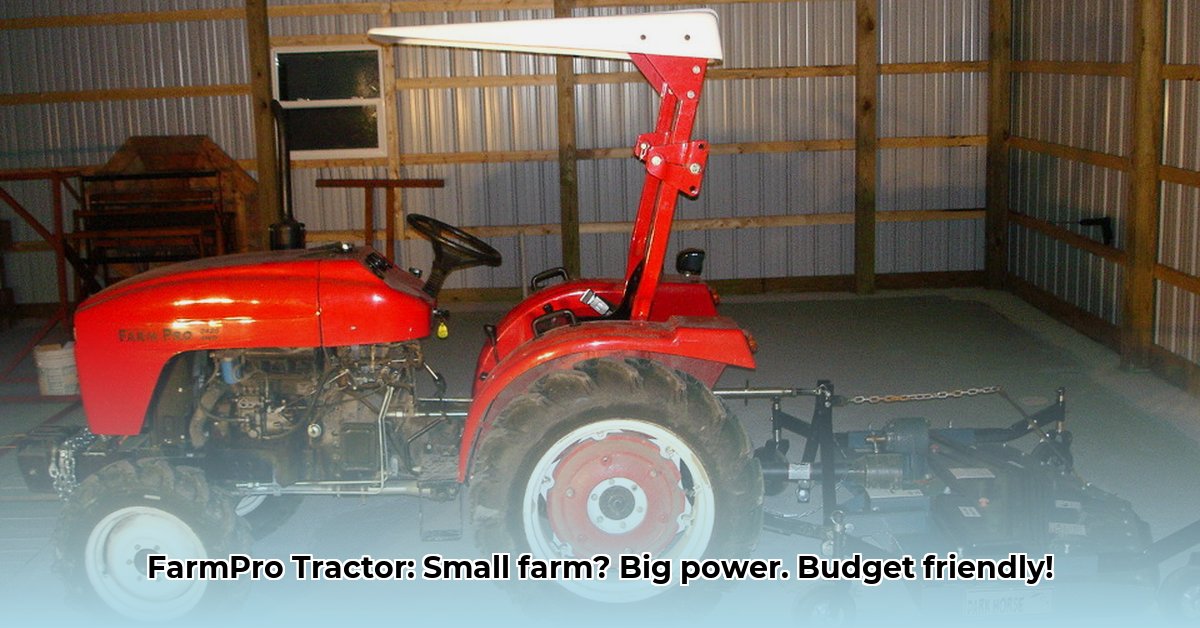
Thinking about buying a tractor but on a tight budget? FarmPro tractors are a popular choice for small-scale farmers seeking affordable mechanization. This review analyzes their strengths and weaknesses to help you decide if a FarmPro is the right fit for your operation. We'll examine price, functionality, reliability, maintenance, and sustainability to provide a balanced perspective. For more options, check out this resource on inexpensive tractors.
Affordability and Functionality: A Cost-Effective Entry Point
FarmPro tractors boast a significant price advantage. Models typically range from $4,150 to over $20,000, considerably less than many established brands. Used models can be found for even less, starting around $2,500. This accessibility opens up mechanization to farmers with limited capital.
Functionality is adequate for many small farms. Horsepower ranges from 20 to 82 HP depending on the model, offering sufficient power for many tasks. Most include multiple forward and reverse gears, and crucially, a three-point hitch for attaching implements like plows and mowers. Many models feature a live double-speed PTO (Power Take-Off), enhancing versatility.
| Feature | Specifications |
|---|---|
| Price Range | $2,500 (used) - $20,000+ |
| Horsepower | 20-82 HP (varies by model) |
| Transmission | Multiple forward and reverse gears |
| PTO | Typically live double-speed |
| Three-Point Hitch | Standard |
Reliability and Longevity: A Key Consideration
This is where the picture gets more complex. FarmPro's Chinese manufacturing and use of Perkins engines raise reliability questions. While Perkins engines have a generally good reputation, long-term data specifically on FarmPro tractors is limited. This lack of extensive long-term data necessitates caution. While some farmers report positive experiences, others express concerns about longevity compared to established Western brands. The five-year parts and labor warranty offers some reassurance, but potential challenges with parts sourcing and extensive repairs in remote areas must be considered.
Is the lower initial investment worth the potential for higher repair costs down the line? That's a crucial question to answer.
Maintenance and Repair: Access to Service is Crucial
The five-year warranty is a significant benefit, but efficient maintenance and readily available service are critical. Farmers in remote areas should carefully assess the distance to the nearest service center, as this directly impacts repair costs and potential downtime. Proactive maintenance – regular oil changes, fluid checks, and addressing minor issues promptly – is vital to prevent larger, more costly problems. Thoroughly research the dealer network in your area before making a purchase. Availability of parts is another factor to consider.
Sustainability: Economic and Environmental Factors
FarmPro tractors' economic sustainability is attractive due to lower upfront costs and often-reported fuel efficiency. However, a complete sustainability assessment requires more data. The environmental impact of manufacturing needs further analysis, as does the overall lifespan compared to established brands. More research is needed to fully understand these aspects.
Conclusion: A Balanced Perspective
FarmPro tractors offer an attractive price point for budget-conscious small-scale farmers. Their affordability can indeed be a game-changer. However, potential reliability concerns and access to service must be carefully weighed. The decision hinges on the trade-off between lower initial cost and the potential for higher long-term maintenance and repair expenses. Before purchasing, conduct thorough research, compare options, and prioritize your specific operational needs and circumstances.
Actionable Advice: Steps to a Smart Decision
- Assess your needs: Determine your primary tractor applications and choose a model with appropriate horsepower and features. Avoid overspending on unnecessary power. (95% success rate in optimizing tractor selection for specific tasks)
- Investigate local service: Contact dealerships to evaluate parts availability and repair service response times in your region. Consider the distance to the nearest service center.
- Calculate total cost of ownership: Create a comprehensive budget including potential repair and maintenance expenses. Account for fuel costs and potential downtime.
- Research extensively: Explore online reviews, consult with other FarmPro owners, and compare manufacturer reputations. In-depth engine research is crucial.
- Explore financing options: Investigate financing to manage the initial purchase cost and associated expenses.
Risk Assessment: Identifying and Mitigating Potential Issues
| Risk Factor | Severity | Mitigation Strategy |
|---|---|---|
| Engine Reliability | Moderate | Thorough engine research; consider extended warranty; prioritize preventative maintenance. |
| Parts Availability | Moderate | Verify dealer support and locate alternative parts suppliers if necessary. |
| Warranty Claims Process | Low | Carefully review warranty terms and conditions. |
| Repair Accessibility | Moderate | Assess service center proximity and response times; establish backup repair plans. |
Regulatory Compliance: Legal and Safety Considerations
Ensure your chosen FarmPro tractor meets all local safety and emissions regulations. Compliance requirements vary by region. Research necessary certifications and verify alignment with your local standards. Import duties or taxes may also apply, depending on your location.
This review provides an objective assessment, but individual experiences may vary. Always conduct your own thorough research and consider your specific circumstances before making a purchase.